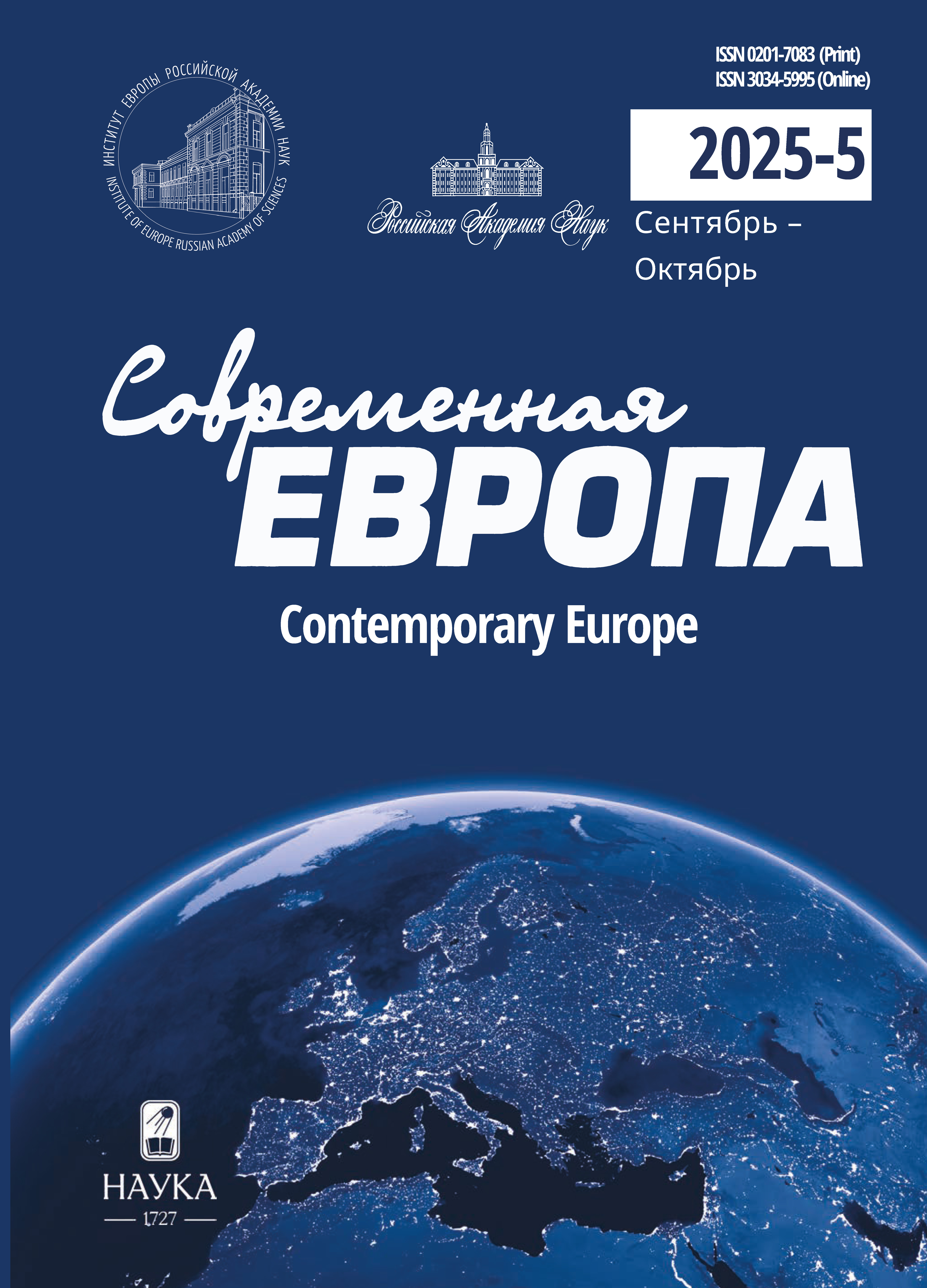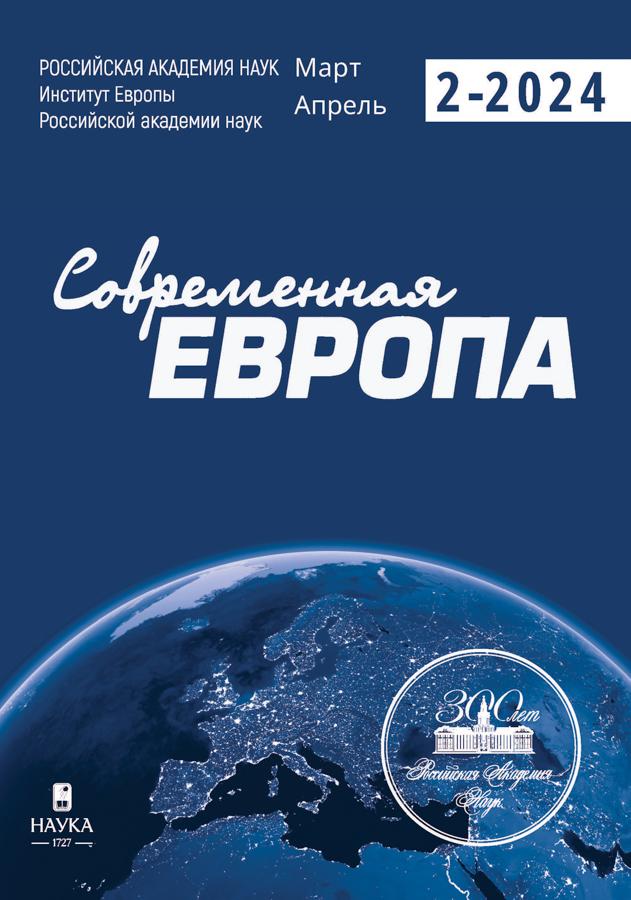ПАМЯТЬ О ПРЕСТУПЛЕНИЯХ КОЛОНИАЛЬНОЙ ЭПОХИ В БЕЛЬГИИ
- Авторы: АНДРЕЕВА А.А1, ДРОЖАЩИХ Н.В1, НЕЛАЕВА Г.А1
-
Учреждения:
- Тюменский государственный университет
- Выпуск: № 2 (123) (2024)
- Страницы: 139-151
- Раздел: Статьи
- URL: https://genescells.com/0201-7083/article/view/652144
- DOI: https://doi.org/10.31857/S0201708324020116
- ID: 652144
Цитировать
Полный текст
Аннотация
На примере Бельгии рассмотрен феномен колониальной амнезии в контексте формирования политики памяти современной Европы. В европейском историческом дискурсе центральными и объединяющими темами признаны Холокост и коммунистическое наследие. Несмотря на официальное осуждение колониализма, среди европейских стран нет единства в отношении к нему. Общественная полемика последних лет по поводу замалчивания преступлений колониальной эпохи подпитывается расследованиями, раскрывающими причастность европейских стран к (пост)колониальному насилию, что вынуждает их приносить публичные извинения. В 2022 г. предметами извинений стала жестокость колониального правления бельгийцев и постколониальные события в начале 1960-х гг., такие как похищение и убийство конголезского премьер-министра Патриса Лумумбы с одобрения бельгийского правительства. Под давлением общественного мнения бывшие колониальные державы вынуждены "перевернуть страницу истории" ради примирения с прошлым и налаживания отношений с африканскими странами. С помощью критического анализа дискурса и качественного и количественного контент-анализа изучены извинения бельгийских официальных лиц, произнесенные и опубликованные в период с 2002 по 2022 г., народу и правительству Демократической Республики Конго. В текстах выявлено стремление квалифицировать действия Бельгии исключительно как моральную ответственность.
Ключевые слова
Об авторах
А. А АНДРЕЕВА
Тюменский государственный университет
Email: a.a.andreeva@utmn.ru
Кандидат филологических наук, доцент Тюмень, Россия
Н. В ДРОЖАЩИХ
Тюменский государственный университет
Email: n.v.drozhashhikh@utmn.ru
Доктор филологических наук, профессор Тюмень, Россия
Г. А НЕЛАЕВА
Тюменский государственный университет
Email: g.a.nelaeva@utmn.ru
Кандидат политических наук, профессор Тюмень, Россия
Список литературы
- Осколков П.В., Сивов Д.А. (2023) Трансформация восприятия колониального опыта в публичном дискурсе Бельгии. Научно-аналитический вестник ИЕ РАН. № 3. С. 166‒174. doi: 10.15211/vestnikieran32023166174
- Bentrovato D., Van Nieuwenhuyse K. (2020) Confronting “dark” colonial pasts: a historical analysis of practices of representation in Belgian and Congolese schools, 1945–2015. Paedagogica Historica. No. 56(3). P. 293‒320. doi: 10.1080/00309230.2019.1572203
- Bosma U., Kolnberger, T. (2017) Military Migrants: Luxembourgers in the Colonial Army of the Dutch East Indies. Itinerario. No. 41(3). P. 555‒580. doi: 10.1017/S0165115317000687
- Fairclough N., Wodak R. (1997) Critical discourse analysis. Discourse studies. A multidisciplinary introduction. Ed. by T.A. van Dijk. SAGE Publications. P. 258–284.
- Hansen P., Jonsson S. (2014) Building Eurafrica: Reviving Colonialism through European Integration, 1920‒1960. Conference Proceedings. 36 p. URL: http://aei.pitt.edu/52859/ (accessed: 31.07.2023).
- Hutchison Y. (2022) Performative Challenges to Belgium’s Colonial Amnesia. Mobilising Archives and Resonant Spaces. Unfinished Histories: Empire and Postcolonial Resonance in Central Africa and Belgium. Ed. by P.-Ph. Fraiture. Leuven University Press, Leuven, Belgium. P. 121–138. doi: 10.1353/book.103914
- Kalter C. (2022). Building Nations After Empire: Post-Imperial Migrations to Portugal in a Western European Context. Contemporary European History. Vol. 33. Issue 1. P. 1‒22. doi: 10.1017/S0960777321000837
- Lotem I. (2021) The Memory of Colonialism in Britain and France. The Sins of Silence. Palgrave Macmillan, London, UK. 428 p. DOI: https://doi.org/10.1007/978-3-030-63719-4
- Mamdani M. (2001) When Victims Become Killers: Colonialism, Nativism, and the Genocide in Rwanda. Princeton University Press. 392 p. DOI: https://doi.org/10.1515/9780691193830
- Manners I. (2002) Normative Power Europe: A Contradiction in Terms? Journal of Common Market Studies. No. 40(2). P. 235‒258. DOI: https://doi.org/10.1111/1468-5965.00353
- Moumen A. (2010) De l'Algérie à la France. Les conditions de départ et d'accueil des rapatriés, pieds-noirs et harkis en 1962. Matériaux pour l’histoire de notre temps. No. 99(3). P. 60‒68. doi: 10.3917/mate.099.0060
- Nicolaïdis K., Sèbe B. (2014) Echoes of Colonialism: The Present of Europe's Past. Cambridge University Press, Cambridge, UK.
- Rial S. (2014) De Nimègue à Java: Les soldats suisses au service de la Hollande XVIIe‒XXe siècle. Centre d'Histoire et de Prospective Militaires, Pully, Switzerland. 285 p.
- Sierp A. (2020) EU Memory Politics and Europe’s Forgotten Colonial Past. Interventions. No. 22(6). P. 686‒702. doi: 10.1080/1369801X.2020.1749701
- Stanard M. (2023) The Leopard, the Lion, and the Cock: Colonial Memories and Monuments in Belgium. Leuven University Press, Leuven, Belgium. 338 p. DOI: https://doi.org/10.2307/j.ctvbtzks3
- Tlostanova M. (2021) Beyond Conservatism and Radicalism? A Decolonial Glimpse into the Post-truth World. Africa’s Radicalisms and Conservatisms. Ed. by E. Etieyibo, O. Katsaura, M. Musemwa. Brill, Leiden, Netherlands. P. 11‒30. DOI: https://doi.org/10.1163/9789004445079_002
- Van Assche J., Roets A., Haesevoets T., Noor M. (2021) “Sorry for Congo, let’s make amends”: Belgians’ ideological worldviews predict attitudes towards apology and reparation for its colonial past. International Review of Social Psychology. No. 34(1). DOI: https://doi.org/10.5334/irsp.486
- Van Dijk T.A. (2000) Ideology: a Multidisciplinary Approach. SAGE Publications. 365 p. DOI: https://doi.org/10.4135/9781446217856
- Verleye Z. (2021) The Lumumba Commission (1999‒2002): Shame, Guilt, and the Post-Imperial Self. Millennium. No. 50(1). P. 3–28. DOI: https://doi.org/10.1177/03058298211050954
- Bentrovato D., Van Nieuwenhuyse K. (2020) Confronting “dark” colonial pasts: a historical analysis of practices of representation in Belgian and Congolese schools, 1945–2015, Paedagogica Historica, 56(3), pp. 293‒320. doi: 10.1080/00309230.2019.1572203
- Bosma U., Kolnberger, T. (2017) Military Migrants: Luxembourgers in the Colonial Army of the Dutch East Indies, Itinerario, 41(3), pp. 555‒580. doi: 10.1017/S0165115317000687
- Fairclough N., Wodak R. (1997) Critical discourse analysis, in van Dijk T.A. (ed.) Discourse studies. A multidisciplinary introduction, SAGE Publications, pp. 258–284.
- Hansen P., Jonsson S. (2014) Building Eurafrica: Reviving Colonialism through European Integration, 1920‒1960, Conference Proceedings. URL: http://aei.pitt.edu/52859/ (accessed: 31.07.2023).
- Hutchison Y. (2022) Performative Challenges to Belgium’s Colonial Amnesia. Mobilising Archives and Resonant Spaces, in Fraiture P.-Ph. (ed.) Unfinished Histories: Empire and Postcolonial Resonance in Central Africa and Belgium, Leuven University Press, Leuven, Belgium, pp. 121–138. doi: 10.1353/book.103914
- Kalter C. (2022). Building Nations After Empire: Post-Imperial Migrations to Portugal in a Western European Context, Contemporary European History, 33(1), pp. 1‒22. doi: 10.1017/S0960777321000837
- Lotem I. (2021) The Memory of Colonialism in Britain and France. The Sins of Silence, Palgrave Macmillan, London, UK.
- Mamdani M. (2001) When Victims Become Killers: Colonialism, Nativism, and the Genocide in Rwanda, Princeton University Press. DOI: https://doi.org/10.1515/9780691193830
- Manners I. (2002) Normative Power Europe: A Contradiction in Terms? Journal of Common Market Studies, 40(2), pp. 235‒258. DOI: https://doi.org/10.1111/1468-5965.00353
- Moumen A. (2010) De l'Algérie à la France. Les conditions de départ et d'accueil des rapatriés, pieds-noirs et harkis en 1962, Matériaux pour l’histoire de notre temps, 99(3), pp. 60‒68. doi: 10.3917/mate.099.0060
- Nicolaïdis K., Sèbe B. (2014) Echoes of Colonialism: The Present of Europe's Past, Cambridge University Press, Cambridge, UK.
- Oskolkov P.V., Sivov D.A. (2023) Transformacija vosprijatija kolonial'nogo opyta v publichnom diskurse Bel'gii [Transformation of Colonial Experience Perceptions in Belgian Public Discourse], Nauchno-analiticheskij vestnik IE RAN, 3, pp. 166‒174. doi: 10.15211/vestnikieran32023166174 (In Russian).
- Rial S. (2014) De Nimègue à Java: Les soldats suisses au service de la Hollande XVIIe‒XXe siècle, Centre d'Histoire et de Prospective Militaires, Pully, Switzerland.
- Sierp A. (2020) EU Memory Politics and Europe’s Forgotten Colonial Past, Interventions, 22(6), pp. 686‒702. doi: 10.1080/1369801X.2020.1749701
- Stanard M. (2023) The Leopard, the Lion, and the Cock: Colonial Memories and Monuments in Belgium, Leuven University Press, Leuven, Belgium. DOI: https://doi.org/10.2307/j.ctvbtzks3
- Tlostanova M. (2021) Beyond Conservatism and Radicalism? A Decolonial Glimpse into the Posttruth World, in Etieyibo E., Katsaura O., Musemwa M. (ed.) Africa’s Radicalisms and Conservatisms, Brill, Leiden, Netherlands, pp. 11‒30. DOI: https://doi.org/10.1163/9789004445079_002
- Van Assche J., Roets A., Haesevoets T., Noor M. (2021) “Sorry for Congo, let’s make amends”: Belgians’ ideological worldviews predict attitudes towards apology and reparation for its colonial past, International Review of Social Psychology, 34(1). DOI: https://doi.org/10.5334/irsp.486
- Van Dijk T.A. (2000) Ideology: a Multidisciplinary Approach, SAGE Publications. DOI: https://doi.org/10.4135/9781446217856
- Verleye Z. (2021) The Lumumba Commission (1999‒2002): Shame, Guilt, and the Post-Imperial Self, Millennium, 50(1), pp. 3–28. DOI: https://doi.org/10.1177/03058298211050954
Дополнительные файлы











